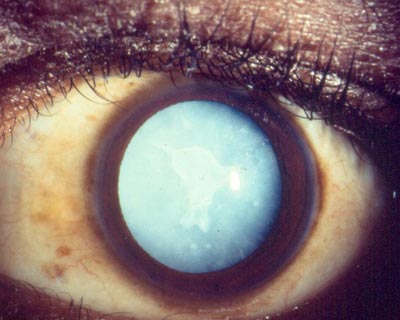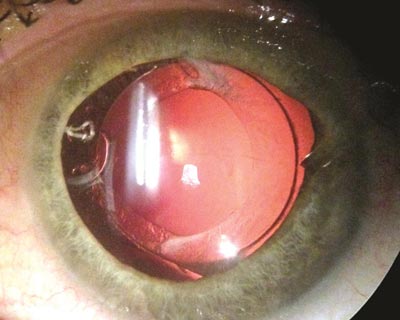Everything you need to know about cataract surgery
Cataract surgery is the most common procedure performed in the UK and has a high success rate. However, the idea of undergoing eye surgery may still seem scary to a lot of us and so consultant ophthalmologist, Professor Sunil Shah, and Medstars’ Will Chadbon are on hand to explain everything you need to know.
What are cataracts?
A cataract is the clouding of the lens of your eye. Your lens is the shape and size of a smartie and sits behind the iris to help focus light into your eye. Usually, we’re born with perfectly clear lenses but, like many things, they can deteriorate with age.
As we get older our lenses fog up, like bathroom glass, which impairs our vision. Initially, the misting of your lens may be subtle, but over time the problem can worsen to significant loss of sight, or even blindness.

How do I know if I need cataract surgery?
You may find that you’re coping well with early cataracts, but the problem gets worse as time goes by and the impairment to your vision cannot be fixed by wearing glasses, or through medications such as eye drops. Therefore, it’s advisable not to wait for the cataracts to ‘ripen’ before considering surgery.
If you’re experiencing hindrances to your day to day life, then surgery can be a good option. Eye test results can give an indication of the severity of your cataracts, but it’s up to you whether or not to go ahead with surgery.

What will happen before the operation?
Before surgery, you’ll meet with a specialist eye doctor for a pre-assessment appointment. During this assessment you’ll undergo a series of eye measurements. The measurements will observe the shape of the front of your eye and the length of your eye. These measurements, combined with some eyesight tests, will help the ophthalmologist or optometrist decide which specific lens is needed for your eye. Throughout this assessment, you can discuss any questions you have about the procedure.
The operation itself
Cataract surgery is carried out in a hospital operation theatre and usually takes between 30 to 45 minutes. Medstars’ consultant ophthalmologist, Professor Sunil Shah, explains, “Before the surgery, you’ll be given the choice to have a local anaesthetic in the form of eye drops, an anaesthetic injection behind the eye to numb it, or a general anaesthetic to fall asleep. If you’re nervous about the procedure, your surgeon may offer you sedation or a Valium tablet to help with anxiety.” The anaesthetic will do its job during the operation but shouldn’t stop you from going home on the same day.
You shouldn’t worry unduly about the surgery. Prof Shah, reassures us that “this is not a painful operation. Most people say the surgery was easier than going to the dentist!”
Once the anaesthetic takes effect, your surgeon will make tiny cuts to the surface of your eye or eyes (you can have both eyes done on the same day). You won’t feel any pain, or see much detail, but may feel some pressure. The cloudy lens will then be broken into tiny pieces using a high-frequency ultrasound device. The remnants of the lens are then gently removed from the eye using suction. Your surgeon will proceed to delicately place a new, clear lens onto your eye. The surgery rarely involves any stitching to your eye and is usually left by your surgeon to heal naturally.
Recovery

Cataract surgery can give multiple benefits that will improve your daily life. You should experience a sharper focus on the things around you, less glare from bright lights, and clearer distinguishability between colours. However, before these improvements become apparent, your eye will need some time to recover.
Professor Shah advises, “You should be able to see better the next day, but significant improvements will occur after about a week. You have to be legal to drive so have to be able to see a number plate at 20.5m – we would advise you about this at your first post-operative check but you should be able to drive within the first week. In terms of getting back to work, we’d prefer you to have a quiet week following the procedure and work from home if possible, but we would advise you according to your specific job.”
Full recovery can take between 4 to 6 weeks. Your eye doctor may prescribe you with eye drops to be used several times a day during this time.
You may also be given a special pair of sunglasses to protect your eye from strong lights, and a protective shield to wear while you sleep. You may find that some redness of the eye, or blurred vision, persists a few days after surgery. This is not uncommon, so don’t panic. Be cautious of strenuous activities and exercises, as well as exposure to water or other substances that may get into your eye as it heals (make sure you shower and bathe with your eye closed).
There is also a chance that you may still need reading glasses after cataract surgery – regardless of which lens you choose. Though some lenses cater well for seeing things up-close, many people find that reading glasses are helpful for some tasks such as reading very small print.
What risks does the surgery carry?
Problems are very rare, with a roughly a 1 in 1,000 chance of permanent damage as a direct result of the operation. However, it’s very unlikely that any damage will be caused to your eye. Any problems that may arise can usually be treated with medicines or additional surgery.
The future of cataract surgery

Professor Shah explains, “In recent years, cataract surgery has seen developments in both the techniques and the types of implants used.”
Laser cataract surgery is becoming more prevalent but is still very new. Professor Shah says that “whilst people think this has been available for a long time, it hasn’t and there are very few cataract lasers available in the United Kingdom. The laser does a lot of the more technically challenging parts of the surgery almost like robotic surgery with the hope of making surgery safer, using less energy in the eye and hence improving outcomes.”
The implants (or intraocular lenses) used have undergone dramatic changes. Traditionally one uses a football shaped single vision implant. So if you have astigmatism, the astigmatism isnt corrected. However, you can put in a rugby balled shaped astigmatism correcting implant that can dramatically improve vision.
In addition, there are now excellent multifocal lenses available. Rather than getting a traditional single vision implant, that only corrects either your distance or near vision (not both), a multifocal implant can allow you to be glasses free most of the time. This is often the implant chosen for private patients as it can result in a dramatic lifestyle change without dependence upon glasses.”
Aside from the surgical developments we’ve already seen, Prof Shah believes the future is in bilateral surgery (performing surgery on both eyes on the same day); “Patients love it. It reduces the anxiety about surgery and improves recovery and time until back to normal living. The traditional approach of doing the two eyes many weeks or months apart is passé.”
This blog has been co-created by consultant ophthalmologist, Professor Sunil Shah, and Medstars’ Will Chadbon.
You can no longer book an appointment with Professor Sunil Shah via Medstars. However, you can book an appointment with one of our expert eye specialists below:
Medstars Medical Concierge Service
Looking for extra guidance when it comes to your healthcare? Sometimes interpreting medical information and making the best decisions can be daunting and complicated. Our private medical concierge service provides easy access to top UK health experts. We guide our patients with genuine choice and trust, offering a bespoke service for anyone in the world seeking private UK healthcare. Learn more about Medstars Medical Concierge Service. Want to learn more about providing our medical concierge service as an employee benefit? Learn more about Medstars Medical Concierge for Business.

